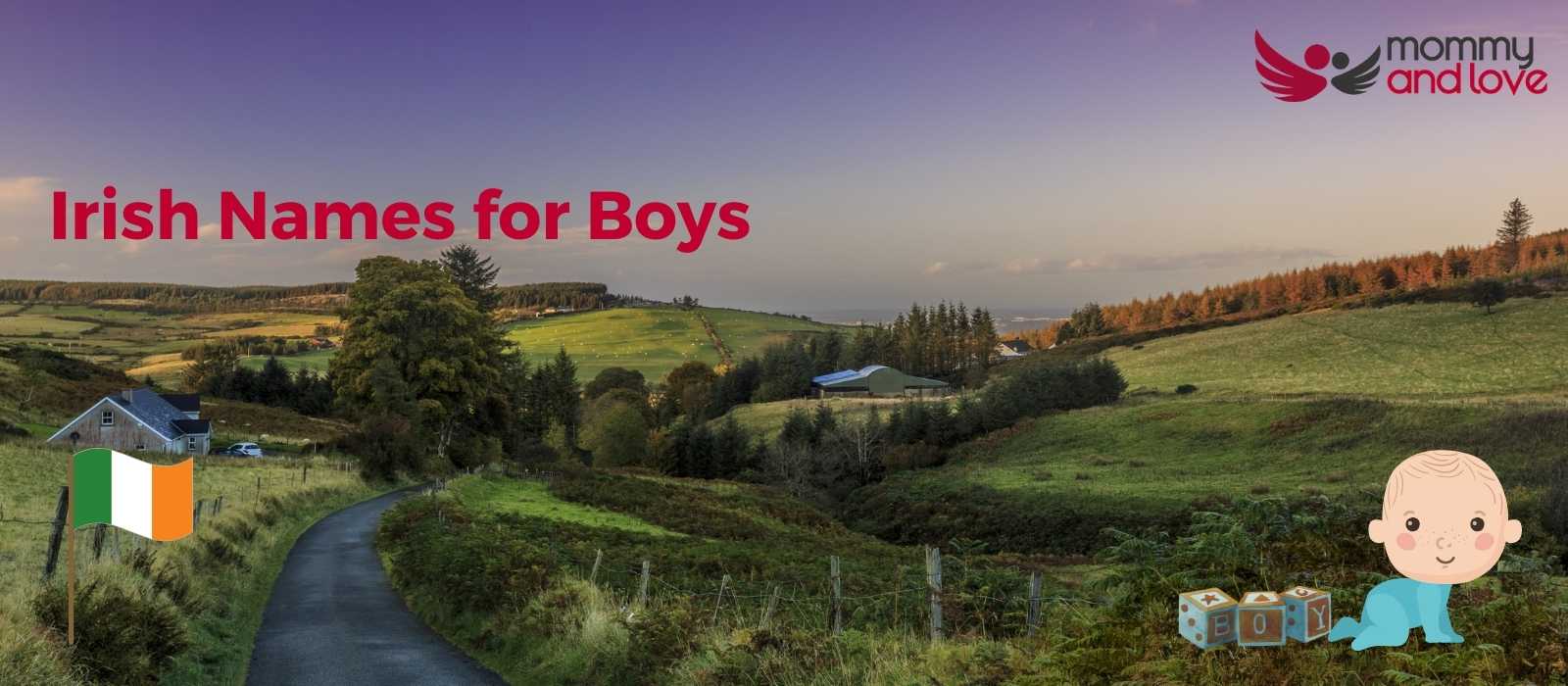Looking for a unique and traditional Irish name for your little boy? Look no further! In this blog post, we will provide you with a comprehensive list of Irish names for boys. These names are steeped in tradition and have been used by the Irish for centuries.
Irish male names on this list are the more traditional names, often stemming from Irish legend and mythology.
Irish Boy Names can be classed into four distinct branches, and when researching an Irish name for your baby boy, you may be drawn to a particular branch, whether it’s a native name or an American version Irish name.
Native Irish Boy Names
Irish baby boy names with Irish roots, where the name stems from an old Irish word and are steeped in Irish history, these are native to Ireland and unique to Ireland. These are the names steeped in Irish legend and folklore, look up any of the mythological tales of Ireland and you will find these names.
These are unique Irish boy names and cannot be anglicized, though many do attribute similar sound names to be their equivalent. Some of these names have fallen out of modern-day use, but I’ve included them here just to ensure we have a complete record.
Here is a list of unique Irish boy names which would be considered native names and whilst they might have a modern variation, they cannot be anglicized though many do try and give them an anglicized version.
Irish Boys Names Beginning with A
- Ailill
- Anéislis
- Aodh
- Aodhán
- Aonghus
- Art
Ailill
This is an old Irish word meaning Elf and is very prominent in Irish mythological tales. Ailill was the husband of Queen Medb (see Maeve) in the Ulster cycle of mythology. The most famous tale is the Táin Bó Cúailnge (cattle raid of Cooley). Again, the name ‘ail’ means beautiful.
Anéislis
Very old traditional Irish name which means careful or thoughtful person. Has been anglicized as Standish. Some have anglicized as Stanislas, however, these names are not etymologically connected as Stanislas is the Latinized for of the Slavonic name Stanslav. Historically Anéislis was the grandfather of An Crom Ua Donnubáin (Crom O’Donovan). Anéislis was also the middle name of Thomas MacDonagh one of the leaders of the 1916 rebellion.
Aodhán / Aidan / Áedán / Aodh
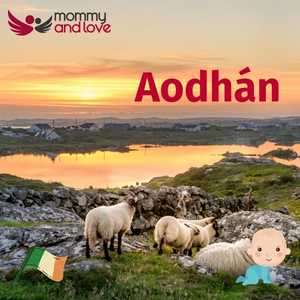
This name is of Irish and Scottish Gaelic origin, and it means “little fire” or “fiery one.” It stems from the name Aodh which means bringer of fire, after the Irisd God Aed, the sun God. The female version is Aodhnait or Aodhamair. See first name for middle name Aiden / Aidan
Aonghus
Aonghus is stems from the Irish name Oíngus, meaning “one choice” or “excellent.” Can be anglicised as Angus.
Árdghal / Ardal / Ardghail
This name means “high valour” and is derived from the Irish words árd, meaning high, and gal, meaning valour. Can be anglicised as Ardal. Ardghail Mor MacMahon was King of Airgíalla (the Oriel – Ulster region) and chief of the MacMahon Clan.
Art

This name is of Celtic origin and can be translated to mean “bear” or “stone.”
Art Mac Cuinn was a legendary High Kind of Ireland, who was grandfather of Grainne, of the famous Grainne and Diarmuid legend.
Irish Boys Names Beginning with B
- Bairre
- Bearach
- Breandán
- Breasal
- Brian
- Briartach
- Breogán
Barra / Bairre
This name is the Irish form of Barry and is derived from the Gaelic word for “hair”, probably a short form for the Irish Fionnbarra or Fionnbharr (fair-haired one).
Bearach / Berach
Bearach comes from the Irish word ‘biorach’ meaning sharp and has been translated to mean a spear, havelin or anything pointed. Saint Berach of Termonbarry is the patron saint of the O’Hanley families. At age 7 he went to Inniskeen in Monaghan to study under Saint Daig.
Breandán / Bréanainn
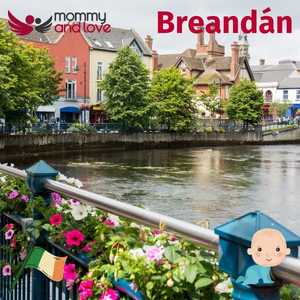
From the old Irish name Brénainn, the Anglicised version is Brendan, which means prince or King. Brénainn mac Caibre was the second King of Uí Maine in 600.
Brian
Brian is derived from an old Irish word meaning high or noble, exalted one. The most famous king in Ireland was Brian Boru (941 – 1014), who was the first true king of all Ireland and ended the Viking invasions. See meaning of the name Brian
Briartach
A very old name which was common in Connacht and a variant form of Muiriartach and means sea man.
Brógan / Brógain / Breogán
From the Irish word for shoe ‘bróg’. Modern form is Brogan. There was an ancient King Breogán who divided Ireland between himself and family and the Tuatha Dé Danann, the Irish pagan gods. Breogán is said to the the ancestor of the Connachta (the Irish dynasty in Connacht). Saint Patricks nephew and scribe was Saint Brogan.
Irish Boys Names Beginning with C
- Cailean
- Cainnech
- Cairbre
- Calbhach
- Caoimhín
- Caolán
- Caolite
- Carthach
- Cathair
- Cathal
- Cathán
- Cathaoir (Cahir) Battleman or warrior
- Cathbharr – helmet, unique to Tirconnell area
- Ceallach
- Cearbhall
- Cian
- Cianán
- Ciarán
- Cillian
- Cinnéididh
- Colm
- Comhghall
- Comhghán
- Conaire
- Conall
- Conán
- Conchobhar
- Conlaodh
- Conor
- Cormac
- Criofan
- Crónán
- Cuán
- Cuimín
Cailean / Coileán (col-lawn)
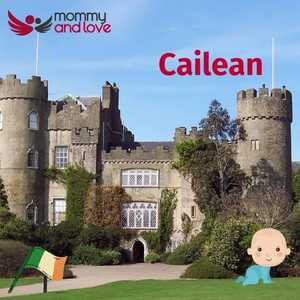
Coileán is and old Irish name which means Colin or gives the Irish surname Collins (O Coilean).
Cainneach
Traditional Irish name that was the name of a large number of early Irish saints, one of which, Cainnech of Aghaboe, founded the town of Cill Chainnigh (Kilkenny). Anglicized as Kenny. A unisex name, most bearers in history have been women such as Cainnech ingen Canannán who was Queen of Ireland in 929.
Cairbre
Translated as chariot rider (but I cannot confirm this is an accurate translation), this old Irish name was the name of the legendary King of Tara, Cairbre Nia Fer in the Ulster cycle who was the brother of Ailill (husband of Medb). Many other high kings also bore the name Cairbre. Anglicized as Carbry or Carbrey.
Calbhach
A traditional name which means bald. Anglicized as Calvagh. Calbhach Ó Domhnaill was a King of Tyrconnel (West Ulster) and chief of the O’Donnell clan in mid 1500’s. Most famous for bringing the English to Ireland to settle his dispute with the O’Neill clan.
Caoimhín (Quee-veen) / Kevin
Caoimhín means noble (Caoim) and -ghin (birth) so can be translated as noble birth and gives rise to the modern variant Kevin. The feminine version is Caoimhe (Quee-va) see meaning of the name Kevin. From the Irish word ‘caomh’ which means comely, beloved. One of the patrons of Dublin is Saint Caoimhín or St Kevin.
Caolán
From the Irish caol meaning slender or fine, Caolán has been anglicized as Keelan.
Caolite / Caílte
Very old Irish name, again which stems from ‘caol’ meaning fine or slender. Caílte Mac Rónáin was the nephew of Fionn mac Cumhaill and was legendary for being a speed runner, a great storyteller and was able to talk to animals. Only Caílte and Oisin survive the Fianna Battle of Gabhra, after Caílte killed three werewolf figures in the Fenian cycle.
Cathair / Cathaoir
Traditional Irish name which means battle man or warrior. Cathair Mór was a High King of Ireland who ruled for three years before being killed by Conn Cétchathach. Cathair Mór was said to have had 30 sons of which many of the Leinster dynasties can trace lineage from. He was the grandfather of Diarmuid from the Diarmuid and Grainne tales.
Cathal
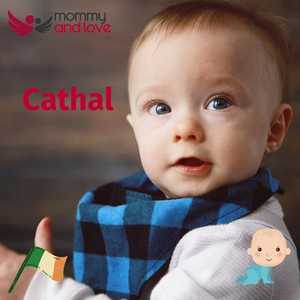
This name is derived from the Irish word cath, meaning “battle,” and ‘val’ meaning rule. Has been anglicised as Charles or Charlton although this means free man from the German Karl, the two names are not connected.
Cathal was a very popular name in Ireland in medieval times and tended to stem from the Munster region.
Cathán
Another name stems from the Irish word ‘cath’ which means battle. Saint Cathán was an Irish missionary who went to the Isle of Bute. Anglicized as Cathan or Chattan, which many placenames in Bute are named after. Cattanachs are said to be followers of this saint and include the families of Macbean, MacPherson and MacPhail.
Ceallach / Cellach
Ceallach is a very old Irish name, mainly associated with the Leinster region, which means bright headed or strife. There were several Kings of Leinster to bear the name including Cellach mac Dúnchada, Cellach mac Brain, and Cellach mac Faelan. Cellach mac Máele Coba was a High King of Ireland in 610, belonging to the northern branch of the Uí Néill clan.
Cearbhall
This means manly or fierce in Irish and is the root of many surnames such as McCarthy, MacCarthy, and Carberry. Anglicized as Carroll.
Cían

This name is of Celtic origin and can be translated to mean “ancient” or “enduring one.” In Irish mythology, Cian was the father of Lugh (the most prominent god in Irish mythology).
Cian was the son in law and ally of Brian Boru and helped him win the Battle of Clontarf which defeated the Vikings in Dublin.
Cianán
Cianán is a diminutive of Cian. This clan name stems from Monaghan and Fermanagh and is meant to come from an older clan name, O’ Cianain meaning descendent of the faithful one.
Ciarán
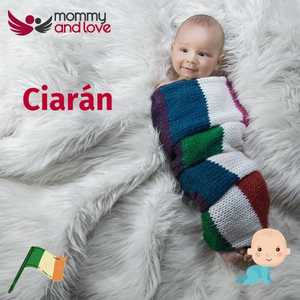
Ciaran means little dark one, (ciar meaning black or dark and ‘an’ meaning little). The feminine form is Ciara. County Kerry is named after the Ciarrage people. See meaning of the name Kieran
Cillian
This name means little Church, with ‘cill’ being church and ‘in’ meaning little. Alternatively it could mean a pet form of Ceallach which means strife or bright headed. Made popular after the actor Cillian Murphy. Saint Cillian was a missionary from Mullagh in Cavan who went to Wurburg and became their patron saint.
Cinnéididh / Kennedy
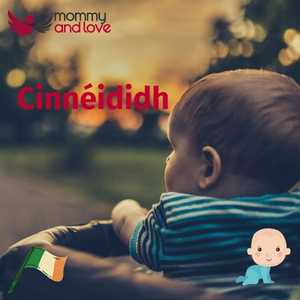
This name roughly translated as helmet head from the Irish word ceann meaning head and wide meaning armour. Cennétig mac Lorcain was the father of Brian Boru and the King of the Dalcassians, and a prominent war king who rose the form the King of Dalcassians to become the King of Munster, his son then becoming the first All Ireland king. See meaning of the name Kennedy
Colm
A beautiful Irish name meaning dove, often extended out to Collum, Colmán or Callum from the Latin word columba meaning dove. Incorrectly translated as Irish name for Colin, the two names are not connected.
Comhghall / Comgall
An old Irish name which means joint pledge. Anglicized as Cowall. In history, Comgall mac Domangairt was the king of the ái Riata in 530. who founded the Cenél Comgaill on the Isle of Bute.
Comhghán / Cómhan
This name means twin, from ‘comh’ joint and ‘gen’ born. St. Comhghán was an Irish prince, son of Cellach Cualann and uncle of St. Fillan. Anglicized as Cowan.
Conall
Very old Irish name meaning strong wolf. Conall Cearnach was a legendary warrior who was born in 50 BC! and hero un the Ulster cycle of Irish mythology. He was said to have had a crooked neck and always slept with the head of Connachtman under his knee!
Conán
Conán means wolf or hound. Conán Maol was a member of the warrior band the Fianna in the Fenian Cycle of Irish mythology and was an ally of Fionn mac Cumhaill who was said to be a fat, foul-mouthed, greedy trouble makers! After many trials, Conán was awarded the fourteen best women in the Land of promise (Tír an nÓg) for always being loyal to Fionn.
Conlaodh / Conláed
Meaning pure and sensible, Conlaodh or Conláed. St Conláed was a Franciscan brother who was born in Leinster and is the patron saint of Kildare for whom he founded the diocese and was the first bishop. He was said to have been a master craftsman and artisan being both a skilled copyist and illuminator of manuscripts and a fine metal worker. He made sacred vessels for St. Brigid for her convent. Anglicized as Conleth.
Conlaoch
Conlaoch means chief, leader, hero. In Irish mythology, Conlaoch was the son of Cú Chulainn and a Scottish warrior woman Aife, who raised him in Scotland. Anglicized as Connla. Cú Chulainn puts three geasa on Conlaoch for when he returns to Ireland, that he cannot turn back once he starts his journey, he must not refuse a challenge and he must never tell anyone his name. This results in Cú Chulainn killing him for Conlaoch wounding one of his warriors in a challenge.
Conchobar / Conor

Conor is the anglicized version of Conchoabar a name that means “lover of hounds.” A shortened version of Conchobhar. The have been many High Kings of Ireland bearing this name. Also can be from the old Irish name Conaire. See meaning of the name Connor
Conn
A traditional Irish name which means ‘chief or leader’. Now generally used as a pet name for Conor, it was originally a separate name. In mythology, Conn was the son of Ler in the Children of Lir legend. Another figure, Conn Cétchathach is better known as Conn of the Hundred Battles was a legendary High King who was the ancestor of the mighty Uí Néill dynasties. On the night of his birth, five roads to Tara were discovered.
Cormac
Cormac is derived from the Irish ‘corb’ meaning raven (a mystical bird in Irish mythology), and ‘mac’ meaning son. Other variations have said that ‘cor’ could be from the old irish word for wheel, suggesting it could mean a charioteer. Cormac was a very popular name in medieval Ireland, most likely due to the three High Kings of Ireland who bore this name.
Cormac Ó Cuilleannáin was a 10th century King of Cashel who was the author of Lebor na Cert (The Book of Rights) in 900. The book lists rents and details of people’s taxes owed to the King of Cashel for their number of oxen, cows, horses, lying women, slaves, chessboards and beehives!
Crónán
Crónán means swarthy one and has been anglicized as Cronan or Cronin. Crónán mac Bécáin (or Mo Chua) was the founder of Balla, which later became Tuam. Cronan was said to suffering from patchy hair on his head and was sent to mind sheep.
St Comgall took pity on him in his neglected state and educated him. On visiting Fore in Westmeath, Crónán mac Bécáin was said to have miraculously pierced a mountain which lay between Leane and Fore and thus brought water to Fore.
Cúán
Cuan means little wolf or little hound. Cúán úa Lothcháin was the Ollamh Érenn (Chief Ollam of Ireland) in 1024. An ollam was a great poet or bard of literature or history and each chief or clan would have its own Ollam. Each province would have a head Ollam in that province and this would have been on the same standing as the King of that province.
Over all of these was the Ollamh Érenn, whose social status was equal to the High King of Ireland. Cúán acted as bard and propagandist for High King Máel Sechnaill mac Domnaill, he was slain in Teathba and it was said that the blood of those that killed him turned putrid within the hour and they died a slow and evil death.
Cuimín / Cumméne
A diminutive of Cam meaning little crooked one. Anglicized as Cumin. Saint Cuimín of Mayo was from a royal family from Killala, his holy well in Kilcummin is said to have healing powers as does his grave where the gravestone, Leac Cuimín, is thought to have been used as a cursing stone to bring ill wishes on people who had caused harm to others.
Criofan / Crimthann / Crevan
Another old Irish name which was born by several high kings of Ireland such as Crimthann mac Fidaig. The name means fox and was used by the Kavanaghs of Leinster.
Irish Boys Names Beginning with D
- Dáire
- Déaglán
- Diarmaid
- Domhnall
- Donn
- Donnchadh
- Dubhaltach
Dáire / Darragh
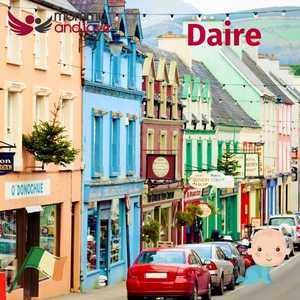
This name means fruitful or fertile. Anglicized as Darragh, though this comes from Darach which means “oak tree.” Daire was the name of an ancient Irish fertility God. Another figure was Dáire Doimthech who was a legendary King of Tara.
Dáithí
This is a very popular name which means swiftness or nimbleness. Whilst some have said it can be angliced as David, this is incorrect the two names are not related. David means beloved. Old variants include Daithin and Daith.
Nath Í mac Fiachrach was better known as Dáithí was an Irish king on the 5th century who died after being struck by lightning when visiting the alps.
Déaglán
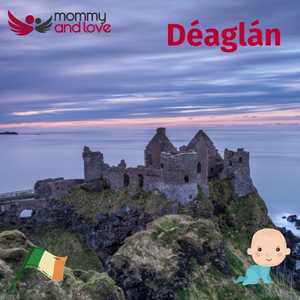
This name means “fully good” or “man of prayer.” Déaglán was an early Christian missionary who is credited with bringing Christianity to Ireland. Very popular early name in Waterford region, mainly down to the popularity of St Declán mac Eircc, an early Irish saint. See meaning of the name Declan Anglicized as Declan.
Diarmaid / Dermot
This name means “free from envy.” Diarmuid was a famous warrior in Irish mythology who was the lover of Grainne. Whilst some have translated this as Jeremy, these names are not connected. Variants include Diarmit, Diarmuit and Diarmuid. Diarmait was the name of several Kings of Tara and Leinster.
Domhnall / Dónal
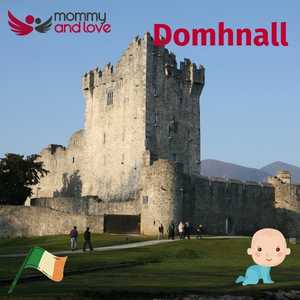
Domhnall means “world ruler or world might” Has been anglicised as Donald (in Scotland) or Daniel though this name is not etymologically related as Daniel means God is my judge.
Donn
This name has fallen out of use and generally now is just a nickname for any of the various male names that begin with ‘Donn’ like Donnacha. It’s translated as being brown or chief / noble. The name is associated with the Maguire family.
Donnacha / Donnchadh / Donncha
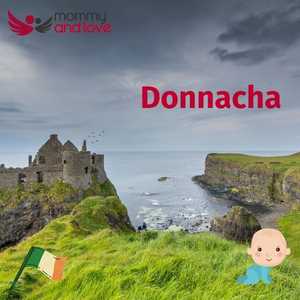
This name means “dark warrior” or “brown warrior or chief.” and generally accepted to mean brown haired warrior. The most famous person in history bearing this name is Donnchad mac Briain, son of Brian Boru the most famous High King of Ireland.
Dubhaltach
Meaning black haired, anglicized as Duald or Dualta. Dubhaltach Mac Fhirbhisigh was an Irish scholar and historian, the last traditionally trained Irish Gaelic scholar was a member of the MacFhirbhisigh Clan from Connacht. His book Leabhar na nGenealach (Book of genealogy) was published in 2004, 300 years after he wrote it in 1649!
Irish Boys Names Beginning with E
- Eachann
- Éanna
- Earnán
- Éibhear
- Éimhín
- Eochaidh
- Eóghan
Eachann
This is an old Irish name which has survived more in Scottlish Gaelic as opposed to Irish. ‘Each’ means horse and ‘donn’ which as we see above can mean brown or noble, so the name can either mean brown horse or noble horse. Some have incorrectly anglicised it as Hector, which is not etymologically related.
Éanna / Enda
Éanna means birdlike and the modern variant Enda.
Earnán
Possibly from the Irish word iarn meaning Iron, this has been anglicized as Ernan or Ernin or even by Earnán de Blaghd as Ernest. There are four Irish saints with the name Earnán, who all seem to be disciples of St Columba.
Éibhear / Eber / Éber
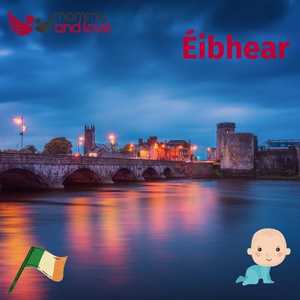
This name translates as granite from the Irish word eibhear, it’s common in the Ulster region of Ireland and has be anglicised as Ivor, though that is a name of Scandinavian origin which means yew. Éber Finn was a high King of Ireland in 1287 BC and founder of the Milesian clan, which is stated as the founder of the all the important royal families in Ireland.
Éimhín
Traditional Irish name which means prompt, on time, speedy. St Éimhín was the abbot and Bishop of Ros-mic-Truin (New Ross) in the 5 or 6th century. He is stated to the the author of the book of the life of St Patrick, the Vita Tripartita. The village of Effin in Limerick is named after him. Name is anglicised as Effin.
Eochaidh / Eochaid
An old name which has all but died out as a forename, though can be seen in the surname Haughey, it used to be a popular name in the O’Hanlons clan. Meaning ‘horse’.
In Irish mythology, Eochaid mac Eirc was the mythological king of the Fir Bolg in c.1500 BC. Known for being the first king to establish a judicial system in Ireland.
Éóghan / Eoghan

This name means “noble born” Can be anglicised as Eugene, though there is debate over this anglicisation. In the Ulster cycle of Irish mythology, Éogan mac Durthacht, is the King of Farney (in Monaghan) and was the rival enemy of the Ulster King Conchobar mac Nessa. He was famous for murdering Naoise (Deirdre’s husband) and Deirdre was told to go live with Éogan for a year but decides to accept death rather than this fate.
Irish Boys Names Beginning with F
- Faolán
- Fearadhach
- Fearchar
- Feardorcha
- Fearghal
- Fearghus
- Féilim
- Fiach
- Fínghin
- Fionn
- Fionnbharr
- Fionnlagh
- Fionntán
- Flann
Faolán / Fáelán
Faolán means “little wolf” from the Irish faol for wold and ‘án’ meaning little. St Faolán was a prince of Munster who founded an abbey in Strath Fillan in Scotland which was named after him. Pronounced fway-lawn. Anglicized as Fillan.
Fearadhach
From the Irish word for man ‘fear’ this has been translated as masculine or manly. Anglicized as Farry. Feradhach mac Lughaidh was the 8th king of Uí Maine in the 6th-century.
Fearchar
Fearchar is an old Irish name which means dear man. Remained more popular in Scotland than in Ireland.
Feardorcha
Anglicized as Fardoragh this name means dark man. The first Baron Dungannon, Matthew O Neill used the alias Feardorcha Ó Néill when he was accepted or adopted by Conn Ó Néill. Feardorcha Ó Cellaigh, 79th and last king of Uí Maine
Fearghal / Fergal
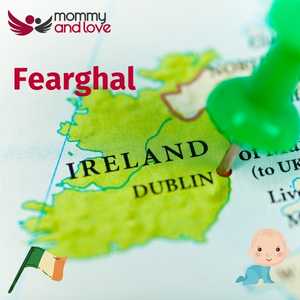
This name means “manly or vigorous.” Fearghal was a popular name in medieval Ireland, most likely due to the many High Kings of Ireland who bore this name. The most famous was Fearghal mac Máeldúin who was part of the Northern Úi Néill dynasty and ruled from 710 to 722. He was known for his murderous exploits into Leinster, until he was slain at the Battle of Allen in 722.
Fearghus / Fergus
A very common old Irish name which means the strong one or the manly one. Fergus Dubdétach (black tooth) was a King of the Ulaid and briefly High King of Ireland, and confusingly having two brothers also named Fergus, Fergus Caisfhiachlach (rough tooth) and Fergus Foltlebair (long hair).
Another legendary king of Ulster was Fergus mac Léti who encounters lúchorpáin, the first reference to leprechauns in irish history. They tried to drag him into the see whilst he slept, but he awakes and seizes them. For their freedom, they grant him three wishes, one of which is the ability to breathe underwater.
Féichín
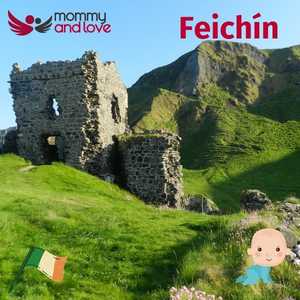
This name stems from the Irish ‘fiach’ meaning a raven, adding the ‘in’ means little so it means little raven.
Saint Féichín of Fore founded the monastry at Fore in Westmeath. He was said to have received the name Féichín when his mother saw him eating a bone and called mo fiachan, my little raven.
Saint Féichín was said to have perished in a plague he was asked to inflict on the poor by Diarmait Mac Aedo to reduce their numbers. He did, and died of the plague himself.
Féilim / Feidhlim / Feidhelm (pronounced fay-lim)
This name is a beautiful old Irish name and was the name of three kings of Munster. It comes from the Irish word feidhil meaning beauty or ‘the ever good’. Has been anglicised as Philip or Felix but these names are not etymologically related, with Felix meaning happy or lucky. Shortened version of the very old name Feidhlimidh! One of the best Irish boy names!
Fiach /Fiacha / Fiachra
Fiach comes from the old Irish word fiach which means raven.
Fínghin (Fineen or Finnin)
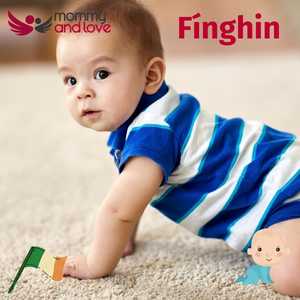
This is a very old Irish name which means fair offspring, and was mainly used in the West Munster region of Ireland. Whilst some have anglicised this as Florence, it is not. Fínghin mac Donncha Mac Carthaig was a famous Irish prince and the last Mac Carthy prince before the English colonised Ireland.
Fionán
Ancient Irish name, born by many early Irish saints, the most notable was St Fionan who built a wooden church in Lindisfarne. Diminutive of Fionn meaning fair.
Fionn / Finn
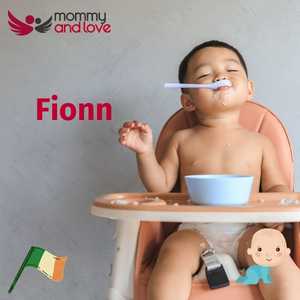
Fionn literally means ‘fair’ or white. It can be translated as ‘blond’ or ‘fair-haired’.
Perhaps one of the most famous characters in Iriswh mythology is Fionn mac Cumhuaill (Finn Mac Cool), who had a magic thumb which had all the wisdom within it. His tales are found in the Fenian Cycle and he is the father of Oisin. See meaning of the name Finn
Fionnbharr / Finbar
Fionnbharr means fair headed one. In Irish mythology Fionnbharr or Finvarra was the king of the Daoine Sidhe (a supernatural race in Celtic mythology) or the King of the Dead, his wife was Queen Oona and their castle was in Tuam in Galway.
Fionnlagh / Finlay
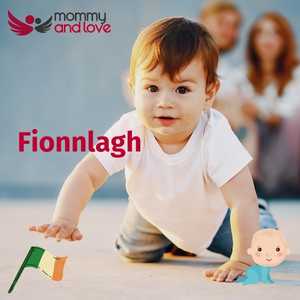
Another diminutive of fionn meaning fair and lagh which means warrior. More common in Scotland than Ireland now. See Names that go with Finley
Fionntán / Fintan
Another diminute of fionn, meaning fair. In Irish mythology Fionntán mac Bóchra was the sole survivor of the Great Flood, where all his companions were drowned but he was turned into a salmon. He was a shape shifter who could turn into salmon, and might be the Salmon of Wisdom. He was said to have lived 5000 years and was an advisor to the kings of Ireland.
Flann / Flainn / Floinn
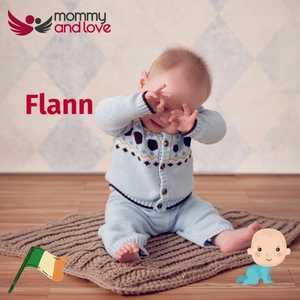
A very old name in Ireland which means red, bloody, sanguinary. Flann mac Maíl Sechnaill (Flann Sinna) was a High King if Ireland or King of Tara in 877-916 as part of the Uí Néill kingship. Flannán is a diminutive of it.
Irish Boys Names Beginning with G
- Garaidh
Garaidh / Garaid
Whilst this has been anglicised as Gary, the two names are not etymologically related with Garaidh meaning pasture, land around a house, or garden whilst Gary is from the germanic word meaning spear. Sìdh-garaidh is translated as fairy garden or fairy pasture.
Irish Boys Names Beginning with I
- Iarlaith
- Irial
Iarlaithe / Iarlaith / Iarfhlaith / Iarla / Jarlath
Fhlaith is the Irish word for prince, and this is generally translated as meaning, Earl Prince or leader. Iarla is the modern variant and is pronounced ear-la. St Iarlaithe of Tuam was the first bishop of Tuam where he founded a monastry.
Irish Boys Names Beginning with L
- Lactna
- Lonán
- Lorcán
- Lughaidh
Lachtna
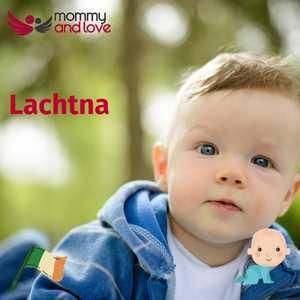
An old Irish name relating to Brian Boru (his great grandfather was Lachtna). Lacthna has been translated as ‘of milk, milk coloured’ though the Irish word for milk is bainne. It has also been anglicised to Lucius, though that name means light. Some have suggested it means grey, from the Irish liath, which is the closest translation. A once common name in the Ui Fiachrach clan, it now seems to have fallen away.
Lonán
Lonan is an old Irish name meaning little blackbird. Lon meaning blackbird and ‘án’ meaning little.
Lorcán / Lorcáin
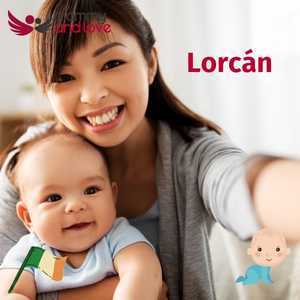
In Irish history, Lorcáin mac Lachtna was the King of the Dál gCais and the grandfather of Brian Boru. Lorc means fierce and again ‘án’ means little. In history, St. Lorcan was the patron saint of Dublin. Has been anglicised as Laurence but these names are not etymologically related, Laurence means bright one or shining one.
Lugaid / Lughaí / Lughaidh
A very popular ancient Irish name was the name of several high Kings of Ireland from the first to the ninth century. The name is thought to derive from the Celtic God Lug, one of the most prominent gods in Irish mythology who was a warrior a king and a master craftsman. The County Louth in Ireland is named after him. The most famous Lugaid was Lugaid mac Con Roí, the killer of Cuchulainn who conspired with Queen Medb.
Irish Boys Names Beginning with M
- Maelsheachlainn
- Maine
- Muircheartach
- Muiredach
- Muirgheas
- Murchadh
Maeleachlainn / Maelsheachlainn / Máel Sechnaill
This is a very old Irish name attributed to many Irish kings, most notably Máel Sechnaill mac Domnaill who was High King of Ireland in 1022 and fought the Vikings in the Battle of Tara to gain control of the Kingdom of Dublin. (pronounced male-shock-lin). Has been anglicised as Malachy though that name means messenger of the Lord whilst Máel Sechnaill means follower of Seachnall.
Maine
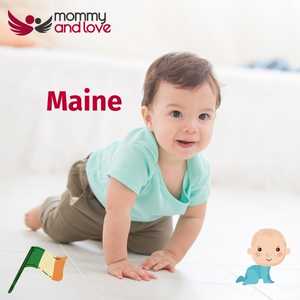
Maine is a very old Irish name and borne by many Kings of Ireland, notably Máine Mór Mac Eochaidh (Máine Mór) who founded the kingdom of Ui Maine in Connacht.
Muirchertach / Murtagh
Muirchearteach can be broken down to ‘muir’ meaning sea and ‘cheart’ meaning right so sea expert or mariner. Incorrectly anglicised to Mortimer which it is not etymologically related to, Mortimer means dead sea. Name of many High Kings of Ireland including Muirchertach Ua Briain who was a great grandson of Brian Boru.
Muiredach, Muireadhach or Muireach
Muiredach is a very ancient Irish name which means seaman or sea lord from ‘muir’ sea, though now accepted as meaning chieftain or lord. Has been anglicised as the Scottish form Murdoch or Irish form Murray. Once again, many Irish kings bore this name including Muiredach Bolgrach a High King of Ireland who took power after killing Dui Finn, only to be killed a short while later by Dui Finns son, Enna Derg.
Muirgheas
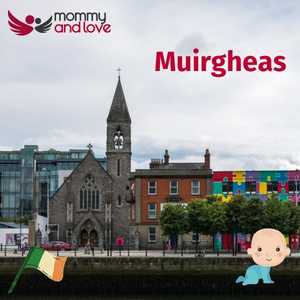
Another ancient Irish name related to the sea, this time meaning sea force / vigor from ‘muir’ sea and ‘gus’ which means force, vigor, spirit. Notable Irish kings with this name include Muirgheas mac Aedh who was the King of Uí Díarmata (a kingdom in County Galway). Has been anglicised as Maurice but these names are not etymologically related, with Maurice meaning a man of Moorish lineage.
Murchadh
Murchadh is another sea name, with the sea coming from ‘muir’ and ‘chadh’ generally accepted as meaning battle or warrior so it means sea warrior. Anglicised as Morgan though this means sea born. In history, many Irish kings had this name including Murchad mac Áedo who was the King of Connacht in 840.
Irish Boys Names Beginning with N
- Niall
Niall / Neill
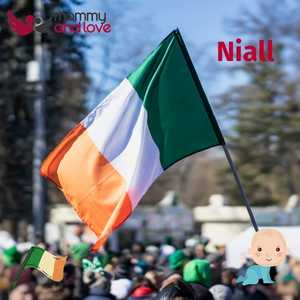
Niall is a very old Irish name that remains one of the most popular Irish baby boy names today. Said to come from the Irish niadh meaning champion, however, the name is so old, that no one really knows the true Irish origins of the name.
Niall of the Nine Hostages is probably the most famous bearer of the name, who was a semi-mythical Irish king and the founder of the Uí Néill dynasties who held the Kinship of the Northern half of Ireland for centuries. See meaning of the name Niall
Irish Boys Names Beginning with O
- Odhrán
- Oisín
- Oscar (See Names that go with Oscar)
Odhrán / Odrán / Odráin
This is a very old Irish name which has become a popular Irish boy name once again. Whilst it has been generally translated as a little pale green one, from the old Celtic word order, I’m struggling to confirm this definition. Pale green in Irish is bánghlas (bán being white, and glas being green) and odhar means dun-coloured grey not pale green.
Another translation gives it has greyish brown dun coloured animal from the Irish world odhran which seems more likely. Odhran Ua hEolais is the most known bearer of the name and he was a medieval scribe from Leitrim
Oisín
Oisin is a very old Irish name which means little deer or fawn from ‘os’ meaning deer and ‘in’ meaning little. In Irish mythology, Oisín is held as Ireland’s greatest poet from the Fenian cycle. He is the son of the legendary Fionn Mac Cumhaill (Finn Mac Cool) and Sadhbh and is said to have written much of the Fenian cycle.
Oscar
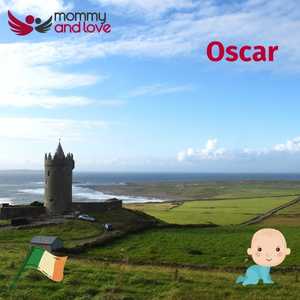
Another Irish name which means friend of deer from ‘os’ meaning deer and ‘car’ meaning friend or loving so deer lover. In Irish mythology, Oscar is the son of Oisín and Niamh and grandson of Fionn Mac Cumhaill. There is a very similar German name Oskar which means god spear. See meaning of the name Oscar
Irish Boys Names Beginning with R
- Rían
- Rónán
- Ruairí
Rían / Ryan
The old Irish name Rian which means little king and is one of those strong Irish boy names that have been popular in Ireland for literally centuries. See meaning of the name Ryan
Rónán
Rónán is an old Irish name which means little seal from the Irish rón meaning seal and ‘án’ meaning little. In Irish mythology, Rónán is the name given to the children borne to a seal maiden who swan too close to the shore and became trapped in human form, marrying a fisherman and bearing him children. See meaning of the name Ronan
Ruairí /Ruaidhrí /Ruaidhrígh/ Rudhraighe/ Ruaraidh (Rory)
This is a gorgeous name for any little baby boy, from the ruadh (meaning red or red haired) and rígh meaning king or royalty so meaning the red-haired king. The most famous bearer in history was Rudraige mac Sithrigi who was a medieval High King of Ireland who came to the throne after killing the previous king Crimthann Coscrach.
He was associated with the Uliad in eastern Ulster. Lots of spelling variations but Ruairi is probably the most common version now. See meaning of the name Rory
Irish Boys Names Beginning with S
- Searbhreathach
Irish Boys Names Beginning with T
- Tadhg
- Toirdelbach
Tiarnán / Tighearnán / Tiernan
Tighearnán is a very old Irish name meaning little lord. The most famous bearer of the name was Tighearnán Mór Ua Ruairc who ruled the kingdom of Breifne (Leitrim and Cavan) in the twelfth century. He is most well known for expelling Diarmait Mac Murchada who was the King of Leinster from Ireland in 1166 after Diarmait abducted his wife, Derbforgaill.
This expulsion later lead to the first Norman invasion of Ireland in which they conquered large swathes of Irish land. This is a really strong name for any baby boys who want to be little Lord in the emerald isle!
Tadhg
Toirdelbach
Top Irish Boy Names Derived from the Bible
The next set can be defined as Biblical Irish baby names. These are popular Irish boy names which stem from Latin and the Bible and now have their own Irish version. You can trace the etymological route of the Irish name to its Latin origins.
Most of these names are of Hebrew origin. We’ve mainly covered these names elsewhere and will link to the main Anglicized form for meaning from the Gaelic form.
- Abracham (Abraham See Names that go with Abraham)
- Adhamh (Adam See meaning of the name Adam)
- Árón (Aaron See names like Aaron)
- Biniáimin (Benjamin See meaning of the name Benjamin)
- Daibhí (from the hebrew name David See Names that go with David)
- Dainéal (Daniel See names like Daniel)
- Eafráim (Ephraim)
- Gaibrial (Gabriel See nicknames for Gabriel)
- Íosac (Isaac See Middle names that go with Isaac)
- Iósua (Joshua See nicknames for Joshua)
- Irimia (Jeremy See meaning of the name Jeremy)
- Maitiú (Matthew See nicknames for Matthew)
- Maois (Moses See Names that go with Moses)
- Mícheál / Maidhc in pet form) (Michael/Mike See names like Michael)
- Nóe (Noah See Names that go with Noah)
- Parthalán (Bartholomew)
- Samúéil (Samuel See Names that go with Samuel)
- Seán (John See names like John)
- Séamus (James See nicknames for James)
- Seosamh (Joseph See meaning of the name Joseph)
- Síomón (Simon See Names that go with Simon)
- Solamh (Soloman)
- Tomás (Thomas See names like Thomas)
Popular Irish Boys Names with Germanic Roots
Like the Biblical names, these are an Irish version of Germanic names. These were given an Irish version hundreds of years ago and would be considered popular irish boy names, but are not native.
Whilst these Irish baby boy names are very Irish, they are in fact the Irish version of traditional Germanic names and don’t historically speaking have an Irish origin. Unlike the traditional Irish names which feature heavily in Irish legends and Irish folklore, these names are an Irish variation rather than an Irish origin name.
- Amhlaoibh (Humphrey)
- Annraoi (Henry)
- Dubhghall (Dougal)
- Éamonn (Edmund)
- Gearóid (Gerald)
- Ímar (Ivor)
- Liam from Uilliam (William See Middle names that go with William)
- Maghnus (Magnus)
- Raghnall (Ragnall)
- Risteárd (Richard See meaning of the name Richard)
- Roibeárd (Robert See names like Robert)
- Séarlas (Charles See meaning of the name Charles)
- Somhairle (Sorley)
- Tiobóid (Theobald)
- Tormond (Norman)
- Ualtar (Walter)
- Ùisdean (Hugh)
Irish Baby Boy Names Derived from Latin / Greek Names
- Aindréas (Andrew See meaning of the name Andrew)
- Antóin (Anthony Names that go with Anthony)
- Caolan (from the Latin Coelanus – Keelan)
- Críostóir (Christopher See names like Christopher)
- Damhnaic (Dominic See meaning of the name Dominic)
- Pádraig (Patrick from the latin word patricius and is one of the patron saint of Ireland See Names that go with Patrick).
- Proinsias (Francis See names like Francis)
- Giolla Críost (Gilla Crist)
- Gréagóir (Gregory See meaning of the name Gregory)
- Labhrás (Laurence)
- León (Leon)
- Máirtín (Martin See names like Martin)
- Marcas (Mark See meaning of the name Mark)
- Nioclás (Nicholas See Names that go with Nicholas)
- Nollaig (Noel See Names that go with Noel)
- Peadar (Peter See names like Peter)
- Pilib (Phillip)
- Pól (Paul See names like Paul)
- Seoirse (George See nicknames for George)
- Stíofán (Steven See Names that go with Steven)
- Téodóir (Theodore See names like Theodore)
- Uinseann (Vincent See names like Vincent)
Ailín / Álainn
This is a very old Irish name and can be anglicised as Alan or Allen which means beautiful, stemming from the Latin form Ailenus. Technically these two Irish boy names are two different names, but as they both stem from the same Latin word, we’ve combined them.
Caolán (kay-lawn) / Keelan
Caolan stems from the Irish ‘caol’ meaning slender or fine.
American Irish Baby Boy Names
The final set of Irish boy names comes from the Irish diaspora worldwide, often taking a family surname and blending it into a first name to keep their Irish roots. Whilst traditionally these would not have been recognised as names in Ireland, in recent years they have begun to be seen more and more in Ireland.
Many of these names have developed with the Irish diaspora, and generally can be traced back to Irish surnames, which again stem from Irish clan names. These names fell into first name use as Irish emigrants strove to remember their roots and history. Often the mother’s maiden name was used as the first name, and in time these names have grown to be very popular.
- Dillon
- Cory
- Cullen (meaning holly tree) See meaning of the name Cullen
- Cashel
- Murphy (See names like Murphy)
- Lennon (See Middle names that go with Lennon)
- Lennox (See names like Lennox)
- Larkin
- Nolan (See meaning of the name Nolan)
- Quinn (See names like Quinn)
The Bottom Line on the Top Irish Boy Names
Whether you are looking for a baby boy name which is steeped in Irish history and mythology or a modern version of this name which is more commonly used in English speaking countries, our lists above given you lots of options! Whether you are looking for a first name or a middle name for your baby, this complete list has hopefully inspired you!

